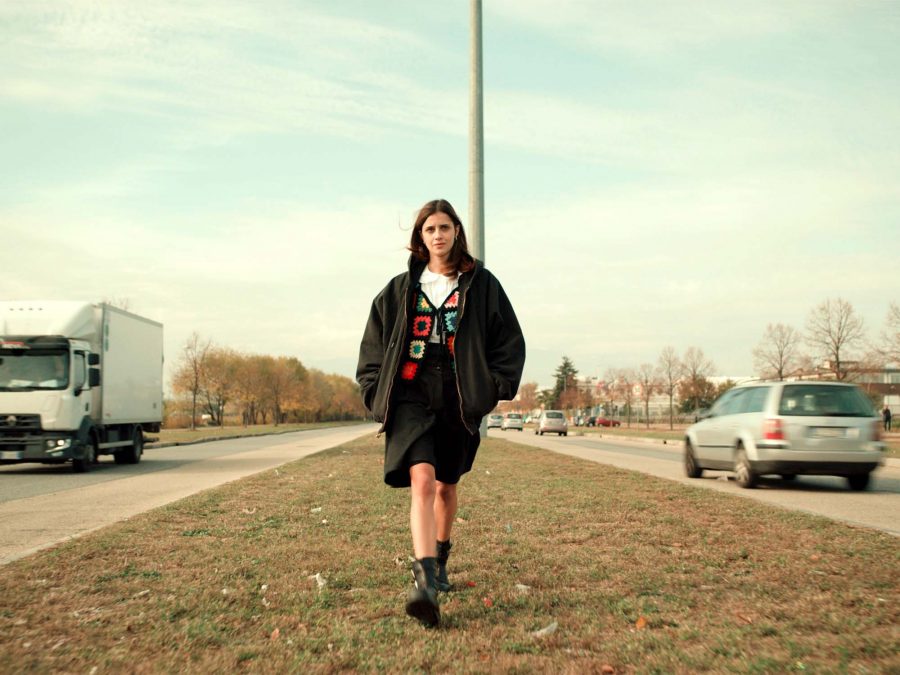Cinemas are full of lonely people. They occupy both seats and screens – the stories we return to often focus on the daunting quest to find someone as strange as you with whom to share the peculiar inner workings of your mind. This mission to find a friend is the subject of Carolina Cavalli’s Amanda, as the eponymous protagonist determines to revive a childhood friendship with a girl named Rebecca who hasn’t left her bedroom for years, so she has someone to go to the cinema with.
Amanda is introduced at a point where everyone has had enough of her shit. Her languid isolation is framed by luxury, and her redeeming features dwindle the longer she floats on her lilo of arrested development atop her pool of angst. Twenty-five years old and without a friend in the world, Amanda stomps around her family’s villa in her magnificent culottes, looking busy. Benedetta Porcaroli (of 2018’s highs-school drama series Baby) embodies Amanda’s frenetic obtuseness, assisted by the excellent choices of costume designer Francesca Cibischino.
The lack of outfit changes adds cartoonish comedy, as Amanda leaps past doorways in her bother-boots, determined to avoid visitors. The setting is interestingly affirming of her social reticence – the family home, down a pine-lined track, is faded-grand but not unwelcoming, while the rest of the city is standoffishly dilapidated. Why would she or Rebecca venture there?
Jaunty surreality effectively conveys the otherworldly desolation of having no one to talk to, and the fight-or-flight fear brought on by social situations for the unsocialised. The anguish of being unsure when to leave a situation, the melancholy of going or not going to parties by yourself, the humiliation of misreading the gestures of well-meaning blokes, and the horror of being asked “what are you up to at the weekend?” if you aren’t up to anything at all, are viscerally evoked.

Amanda’s take on loneliness borrows from previous films exploring youthful isolation in tone and tempo – staccato, cartoonish movements are Andersonian, Moonrise Kingdom-ish – but it is darker. Though humorous and not without hope, this is no fairy tale, for the monster under the bed is existential despair – and many of the characters encountered are touched by this.
There is also a grimy modernity going on. Finding reasons to leave the house and speak to people is a fairly universal first world problem post the-pandemic-that-shall-not-be-named, as many human interactions are mediated by a screen, and childhood in general can last longer and longer – particularly for those who aren’t landed gentry, because of the various economic factors that delay the possibility of flying the nest.
There is an unbalance created by this nasty unpopped kernel of a grim, pallid version of reality at its core, beneath the sweet surrealness of stolen horses and firecrackers. Too real for its whimsy and too whimsical to be realistic, Amanda will likely linger on those people who don’t leave their bedrooms much, more than on the reasons why they should – and that stunts its charm.
Little White Lies is committed to championing great movies and the talented people who make them.
ANTICIPATION.
Intrigued - the story sounds like a children's book with a touch of incel. 3
ENJOYMENT.
Amelie’s rich uncouth Italian cousin – enjoyably unhinged until you start thinking about it. 4
IN RETROSPECT.
Gotta pair your culottes with some mates gals. 3
Directed by
Carolina Cavalli
Starring
Benedetta Porcaroli, Galatéa Bellugi, Michele Bravi
The post Amanda appeared first on Little White Lies.
from Little White Lies https://ift.tt/CQz4ERJ
via IFTTT

0 Comments